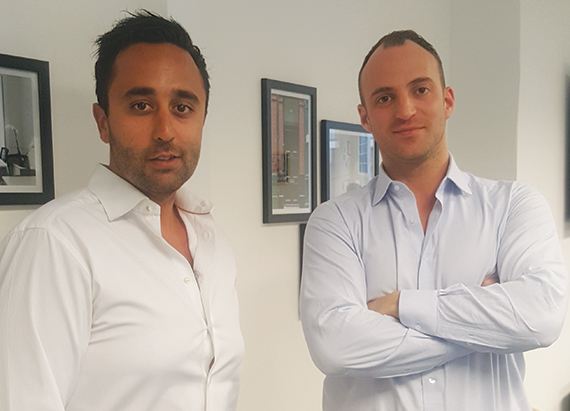 Marie Grove-Walton had a problem: the offices she was viewing in W1 were, basically, rubbish.
Marie Grove-Walton had a problem: the offices she was viewing in W1 were, basically, rubbish.
The fashion and luxury brand consultant and her four-strong team need respectable premises at the right address. After all, you can’t represent a stable of upmarket watchmakers and jewellers without looking your best.
“We were relocating from Mortimer Street, and finding space in W1 was very difficult – a nightmare. There were lots of serviced offices, yes, but they were badly kept. The bathroom was in a disarray or there were old, cheap light fittings. Neither of these things are difficult to fix but landlords obviously didn’t want to bother,” Grove-Walton recalls. “Of course price matters, but in my business you don’t want to look tatty.”
For Jonathan Masri, director and co-founder at niche boutique office provider WorkPad – with outlets in Soho, Covent Garden and Marylebone – this story is all too familiar. He says the core of the West End office market is being killed by the property business.
“The areas we operate in are defined by the businesses that work there – SMEs that make up the heart and soul of their industries but are being priced out of these areas,” he says. The self-imposed task of Masri and partner James Barnett is to put that heart back.
They enter a small but competitive market for characterful, lightly branded West End managed workspace.
Reflex Managed Offices was founded in 1999, and was on to the WorkPad model long ago. Today the firm has 16 town house buildings in W1 and WC1. “We wanted an office in a typical London building, something with a bit of character, something with a Victorian or Edwardian feel. We wanted the plug-and-play offices that business centres offered but we didn’t want it to feel like a business centre. We wanted it to feel like it was ours,” the firm says.
Ventia – now the Boutique Workplace Company – was acquired for an undisclosed sum late last year by South African retail investor Christo Wiese. Ventia had 25 central London offices, and is now owned by a subsidiary of Wiese’s Tradehold empire. Profits of £3m are expected this year.
Says Masri: “There were 200,000 new businesses created in London in 2015, so there’s a hell of a lot of demand for four- to six-person offices that are decent. They are hard to find.”
“I’m not sure I would wish the search for a decent West End office on my worst enemy, particularly serviced offices, where it’s hard to find something you could show to your clients.”
Competing with providers such as Boutique Workplace and Reflex, the WorkPad model is simple: take a smallish period West End town house in a good location, divide it into floors, make it look presentable, and let it like managed workspace.
Additional rules say do not impose your own branding – clients want to look independent, not like they lean on the crutch of a serviced office – and don’t charge per workspace, charge per room.
The expression WorkPad likes to use for its offer is “private offices” rather than “serviced offices.”
“Nobody does quite what we do,” says Masri, fresh from presiding over the reconfiguration of his firm’s 1,000 sq ft Carnaby Street premises, now split into three lettable (and let) single-occupier floors.
Today WorkPad has seven outlets – and the eighth is just opening in Noel Street, Soho – all totalling 15,000 sq ft. WorkPad is home to 40 businesses and occupancy is 98%.
Because they price by the room, rather than by workstation, it is possible to analyse their income using a hotel-style revenue per sq ft. Today they earn between £206 and £230 of revenue per sq ft, but that is rising and the current peak is £256 per sq ft.
Their rule of thumb is that their input costs are occupational costs (the rent they pay, service charges, rates and so on) plus 20% to refurbish and run the block. Margins are generous – roughly double the input costs.
“We should be able to sustain that level of margin, although we won’t get many economies of scale. The issue will be if input costs go up. We’ve already seen Soho rents rise by 250% in the two-and-a-half years we’ve been in business, and the rents we can charge our customers don’t go up at the same rate,” says Masri.
WorkPad is posting revenue of £2m a year after 30 months of trading.
Numbers like this are a grand reward for a modest initial investment. Masri and James Barnett (see box, right) started with a £10,000 deposit in 2013 – and they have self-funded ever since. “We very recently agreed our first funding facility for expansion, but we haven’t used it yet,” he says.
The aim is to expand slowly to 20,000-25,000 sq ft in the next three years, taking the formula to King’s Cross, Farringdon and London Bridge. Perhaps also Paddington, says Masri. “We want to bring to those areas a W1 feel.”
WorkPad’s calculation is that the period 1,000-2,000 sq ft buildings they are targeting are too small and fiddly for most sizeable investors, and too small for rival serviced office providers. It leaves them free to take 10-year plus leases paying £55-£65 per sq ft.
So how did it work out for Marie and her luxury brand business? They wound up at the WorkPad office at Ganton Street, Soho.
“It’s great, and the price is very competitive – in fact it’s the same price we were quoted by other landlords for tatty buildings, so coming here was a no-brainer,” says Grove-Walton.
Grove Communications won’t be in WorkPad space forever (“We’ll take a conventional lease soon – you kind of have to,” says Marie) but for this growing business a clean, cheerful, unbranded serviced office at the right address has been invaluable.
“Like so many West End occupiers the look of an office matters to us and our clients,” says Marie. If WorkPad has grasped this, there will be no stopping it.
 Who is behind WorkPad?
Who is behind WorkPad?
Jonathan Masri, above left, moved into serviced offices after running an import business shipping over-the-counter reading spectacles from China, and followed that by running his own residential letting agency targeted at international students. He worked in the serviced office industry for nine years, a career direction he fell into after a stint managing a 10,000 sq ft building in Archway, N19, for four years. He founded his Capital Retreat business in 2010, adopting a co-working model from the US.
James Barnett, right, is a former national fencing champion whose jobs have included translating football contracts from English into French (and vice versa). He originally qualified as a lawyer. He has a degree in European Studies and French from Leeds University and a law degree from BPP.











